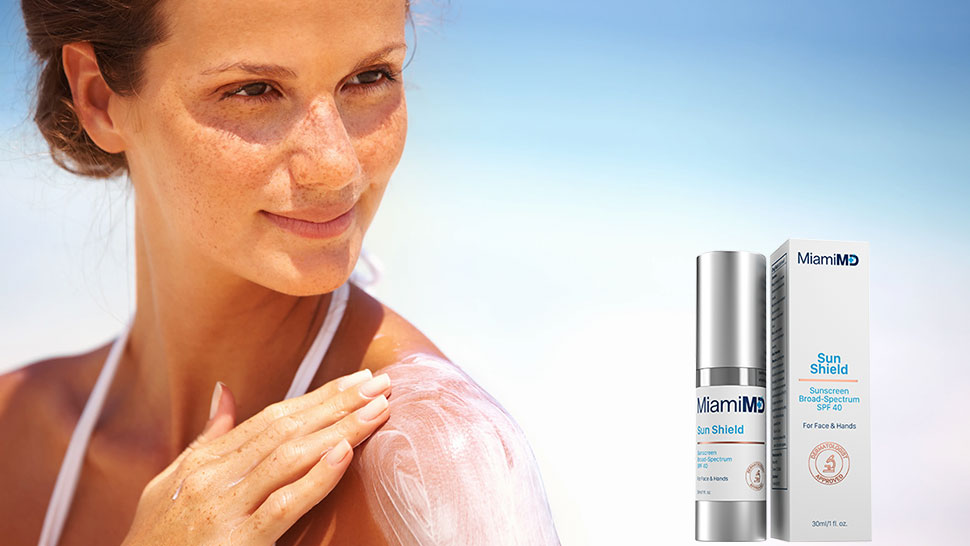What Is a Good Sunscreen for Everyday Use?

When it comes to skincare, sunscreen is non-negotiable to prevent sun damage. Whether you’re spending hours outdoors or just running errands, protecting your skin from harmful UV rays is essential.
That said, with so many options available, how do you choose the best sunscreen for everyday use? Today, we’ll break down what makes a good daily sunscreen and highlight a top recommendation that checks all the boxes.
What Are the Benefits of Wearing Sunscreen?
Daily facial sunscreen use goes beyond just preventing sunburn. It is one of the most important steps you can take to protect your skin and maintain its health over time.
A good sunscreen acts as a shield, guarding your skin against harmful UVA and UVB rays that can lead to premature aging, dark spots, and even skin cancer… but the benefits don’t stop there.
Sunscreen also helps protect your skin from pollution and other environmental stressors that can weaken your skin barrier and cause inflammation. By wearing sunscreen every day, you’re preserving your skin’s appearance and your overall health.
It’s a simple habit with long-term rewards. Here’s why sunscreen should be a staple in your skincare routine:
Manages Sun Exposure
Sun exposure can damage skin over time, even if it doesn’t result in an immediate burn. Prolonged exposure can cause sunspots, uneven pigmentation, and dryness. UV rays are responsible for up to 80% of visible aging (1). Incorporating sunscreen into your routine ensures that your skin stays protected year-round.
Prevents Premature Aging
The sun’s rays accelerate the breakdown of collagen and elastin, the proteins responsible for your skin’s firmness and elasticity. Over time, this damage leads to wrinkles, fine lines, and sagging skin, making you appear older than you are. Regular sunscreen use helps slow this process by shielding your skin from harmful UVA rays, the primary culprit behind photoaging.
In addition to preventing signs of aging, sunscreen helps maintain an even skin tone by reducing the risk of sun-induced discoloration, such as dark spots and hyperpigmentation. Protecting your skin can keep it looking smoother, firmer, and more youthful for years to come.
Reduces the Risk of Skin Cancer
The most compelling reason to wear sunscreen is its proven ability to significantly reduce the risk of skin cancer, including life-threatening melanoma.
According to the American Academy of Dermatology (AAD), sunscreen is essential for everyone, regardless of skin tone. Current estimates are that one in five Americans will develop skin cancer in their lifetime, warns the AAD (2).
Wearing sunscreen daily creates a powerful first line of defense against this preventable disease.
What To Look For in a Daily Sunscreen
When shopping for the best sunscreen for everyday use, it’s essential to consider certain factors that ensure both effectiveness and comfort.
A good daily sunscreen should provide broad-spectrum protection against both UVA and UVB rays to shield your skin from sunburn, premature aging, and long-term damage.
Choosing a sunscreen with a lightweight, non-greasy formula that feels comfortable on your skin is also important, especially if you’ll be layering it under makeup.
Look for additional features like water resistance, suitability for your skin type (such as sensitive or acne-prone skin), and added skincare benefits like hydration or antioxidants to enhance your daily routine. Here’s what to prioritize:
Broad-Spectrum Protection
A broad-spectrum sunscreen protects against both UVA and UVB rays. UVA rays penetrate deeply into the skin, causing aging and wrinkles, while UVB rays are the main cause of sunburn. A product labeled “broad-spectrum” ensures you’re covered on both fronts.
Sun Protection Factor (SPF)
Look for a sunscreen with at least SPF 30, which blocks 97% of UVB rays. If you spend extended time outdoors, consider a higher SPF like SPF 50.
“Sunscreen should be reapplied every two hours or immediately after heavy sweating or swimming,” advises Dr. Joshua Zeichner. “Sunscreen is not impenetrable, so you will still get tan if you are wearing it” (3).
Water-Resistant
For those who sweat or spend time in water, a water-resistant sunscreen is a must. While no sunscreen is completely waterproof, water-resistant formulas provide longer-lasting protection.
Fragrance-Free
Fragrance-free sunscreens are less likely to irritate sensitive skin. Many people also prefer fragrance-free options for daily use because they don’t interfere with perfumes or other skincare products.
How Do Mineral Sunscreens vs. Chemical Sunscreens Compare?
Sunscreens fall into two main categories: mineral (also known as physical sunscreen or sunblock) and chemical.
Both types are designed to protect your skin from harmful UV rays, but they work in very different ways. Choosing the right one depends on your skin type, lifestyle, and personal preferences.
Mineral sunscreens create a physical barrier on the surface of your skin to reflect UV rays, while chemical sunscreens absorb UV rays and convert them into heat before releasing them. Each has its own unique benefits, so understanding how they work can help you make the best choice for your skin’s needs.
Mineral Sunscreen
Mineral sunscreens use zinc oxide or titanium dioxide as active ingredients. These sit on top of the skin and reflect UV rays, making them ideal for sensitive skin. They’re also less likely to cause irritation or breakouts.
However, some mineral sunscreens can leave a white cast, especially on darker skin tones.
Chemical Sunscreen
Chemical sunscreens work by absorbing UV rays and converting them into heat, which is then released from the skin. These formulas might include ingredients like octinoxate, avobenzone, oxybenzone, octocrylene, or octisalate.
Chemical sunscreen formulations tend to be more lightweight and easier to blend with no white cast, making them a good choice for everyday use under makeup. However, they might irritate sensitive or acne-prone skin.
What Active Ingredients Should You Consider in a Sunscreen?
The effectiveness of sunscreen often comes down to its active ingredients. These ingredients provide the protection your skin needs against harmful UV rays. Some are better for sensitive skin, while others are ideal for long-lasting coverage or specific concerns like hyperpigmentation.
Knowing what to look for can make a big difference in how well your sunscreen works. By understanding the role of key active ingredients, you can choose a product that suits your skin type, lifestyle, and the level of protection you need. Here are some of the most important ones to keep in mind:
Zinc Oxide
A staple in mineral sunscreens, zinc oxide provides broad-spectrum protection. It’s also anti-inflammatory, making it suitable for those with sensitive or acne-prone skin.
Titanium Dioxide
Another mineral sunscreen ingredient, titanium dioxide, is lightweight and offers excellent UV protection. It’s often combined with zinc oxide for maximum efficacy.
Aloe Vera
Known for its soothing properties, aloe vera helps calm skin and reduce redness. It’s a bonus ingredient for sunscreens designed for sensitive or irritated skin.
Hyaluronic Acid
This hydrating powerhouse locks in moisture and prevents skin from drying out. Hyaluronic acid is especially beneficial in sunscreens for dry or mature skin types.
Antioxidants
Ingredients like vitamin C and niacinamide provide extra protection by neutralizing free radicals caused by UV exposure. They also promote an even skin tone and improve overall skin health.
What Is the Best Sunscreen for Everyday Use?
Finding the right sunscreen for daily use can feel overwhelming with so many options on the market. The best everyday sunscreen should offer broad-spectrum protection, feel lightweight on the skin, and be easy to incorporate into your routine.
It should also work well under makeup and suit a variety of skin types, including sensitive and acne-prone skin.
Sun Shield Daily Face Sunscreen
After evaluating all the key criteria, one product stands out: Sun Shield Daily Face Sunscreen by MiamiMD. This sunscreen not only provides excellent protection but also feels comfortable enough to wear every day, making it a reliable choice for consistent use.
Our formula provides excellent protection against both UVA and UVB rays, surpassing the Skin Cancer Foundation’s minimum recommendation of SPF 15.
Infused with aloe vera, vitamin C, and vitamin E, this sunscreen not only protects but also hydrates and soothes the skin, working to help prevent wrinkles and fine lines, even out skin tone, and keep skin hydrated.
Whether you have oily, dry, or combination skin, this formula is designed to work for you — and it’s paraben and fragrance-free, so it’s perfect for sensitive skin, too.
Bottom Line
Choosing the best sunscreen for everyday use doesn’t have to be overwhelming. The key is to prioritize broad-spectrum protection, a suitable SPF level, and ingredients that work for your skin type.
Whether you prefer a mineral sunscreen for its gentle formula or a chemical sunscreen for its lightweight texture, the most important thing is consistency — wearing sunscreen every single day.
Sunscreen isn’t just a summer essential. It’s a year-round must-have for healthy, glowing skin.
Sources:
- PubMed Central. “UV rays are responsible for up to 80% of visible aging.” PMC.
- American Academy of Dermatology. “One in five Americans will develop skin cancer in their lifetime.” AAD.
- Dermatologist Dr. Joshua Zeichner. Reapplying Sunscreen. Today.
- Skin Cancer Foundation. “Breaking Down Broad-Spectrum Protection: Why Your Sunscreen Needs to Have it.” Skincancer.org.





